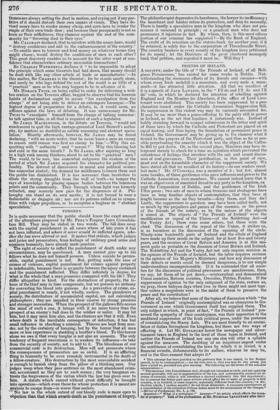FORGERY.
IT is quite necessary that the public should know the exact amount of the alterations proposed by Mr. PEEL'S Forgery Laws Consolida- tion Bill. They may be stated in two words. The bill does away with the capital punishment in all cases where of late years it has not been inflicted, and where it never would be inflicted again., whe- ther the law were altered or not. It makes that statute, which judges and juries and prosecutors, from feelings of ordinary good sense and common humanity, have already made practice. 1 The right of society to inflict the punishment of death under any I circumstances, may be questioned. A man cannot give up to his I fellows what he does not himself possess. Unless suicide be permis- I sible, capital punishment is not. But, putting aside the case of I crimes of violence, capital punishment for crimes against property iis indefensible, because there is no parity between the injury sustained Iand the punishment inflicted. They differ infinitely in degree, for what is the whole that a man possesses compared with his life ? They differ altogether in kind. For the abstraction of property, the la- bour of the thief may in time compensate, but we possess no alchemy for converting his blood into guineas. As a preventive of crime, ca- pital punishment is nearly, if not wholly, useless. The plunderers of 1 society, the distributors of accumulated capital, are not calculating I philosophers ; they are impelled in their course by strong passions and stronger necessities. When the prospect of the gallows flits across the mind of such a one, it brings with it no more terror than the prospect of an enemy's ball does to the soldier or sailor. It may hit him, but it may miss him also, and the chances are that it will. Even where death is the inevitable consequence of detection, it has but small influence in checking a criminal. Thieves are kept from mur- der, not by the certainty of hanging, but by the horror that all men more or less experience in shedding a brother's blood. To this horror alone we owe it that every burglar is not also an assassin. The only \ tendency of frequent executions is to weaken its influence—to take from the security of society, not to add to it. The bloodiness of our commercial code is its destruction. Men will not prosecute where the consequences of prosecution are so awful. It is an afflicting thing to humanity to be even remotely instrumental in the death of a fellow-creature. His destruction by the most unavoidable accident i is enough to banish sleep from the pillow of a thinking man. Our ; judges weep when they pass sentence on the most abandoned crimi- nal, accustomed as they are to such scenes ; the very hangman en- • treats the forgiveness of the victim which the law has given over to him. A statute which cannot without great difficulty be brought , into operation—which even those for whose protection it is meant are • anxious to escape from—is worse than useless. No law in the whole extent of our bloody code is more open to objection than that which awards death as the punishment of forgery, The philanthropist deprecates its harshness, the lawyer its inefficiency; the merchant and banker refuse its protection, and deny its necessity. There is hardly a speculative man in the kingdom who does not pro- nounce it unsound in principle ; or a practical man who does not pronounce it injurious in fact. By whom, then, is this most odious portion of our criminal law supported ?—By the Bank of England. The credit of its retention on the statute-book for another year, if it be retained, is solely due to the corporation of Threadneedle Street. The country bankers in every county of the kingdom have petitioned for its repeal ; let the Directors of the great chartered monopoly back that petition, and repealed it must be. Will they ?


















 Previous page
Previous page